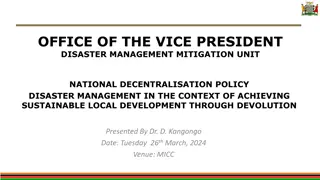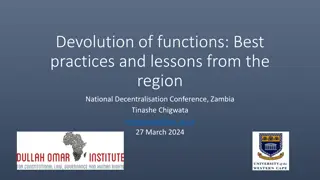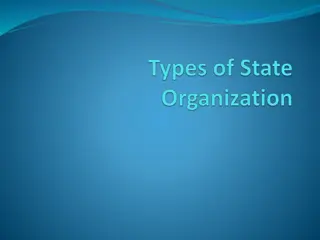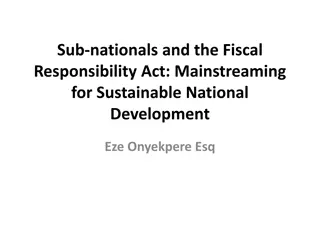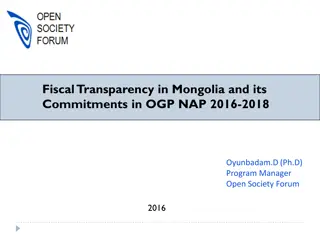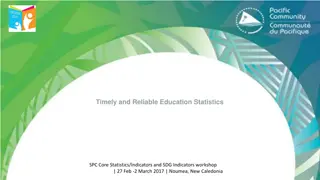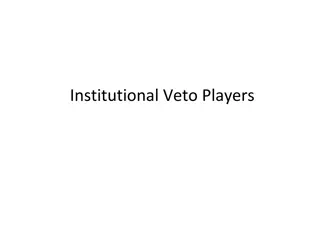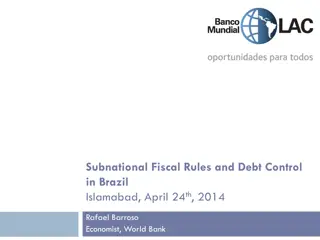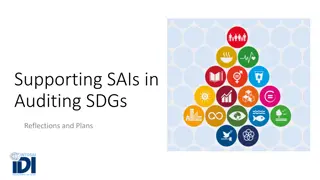INSTITUTIONAL GOVERNANCE FRAMEWORK
Currently, there is a lack of formal structure in the Institutional Housing Governance Framework (IHGF) within the public service system, leading to inefficiencies in managing institutional housing policies. This absence has resulted in deteriorating state assets, unmet housing demands, and ineffect
0 views • 17 slides
Disaster Management and Local Development Through Devolution
The presentation outlined the importance of disaster management in the context of achieving sustainable local development through devolution. It emphasized the need for effective subnational planning, mainstreaming of disaster risk reduction, and financing for disaster relief. The concept of devolut
5 views • 21 slides
Disaster Management and Sustainable Local Development Through Devolution
The presentation explores the integration of disaster management into subnational planning for achieving sustainable local development through devolution. It emphasizes the importance of decentralization, mainstreaming disaster risk reduction, urban areas' resilience, and financing for disaster reli
3 views • 21 slides
Devolution of Functions: Best Practices in Subnational Governance
Understanding the importance of function assignment (FA) in subnational governance is crucial for effective decentralization. By learning from other countries and adopting a progressive FA framework, subnational governments can better achieve local, national, and sustainable development goals. The p
0 views • 14 slides
Overview of Unitary, Confederal, and Federal States
Unitary, confederal, and federal states each have distinct characteristics regarding the distribution of power between central and subnational governments. Unitary states have centralized governance, while devolved states like the UK grant autonomy to subnational entities. Decentralized states trans
0 views • 22 slides
Fiscal Responsibility Act & Sustainable Development Nexus
Sustainable development integrates environmental health with economic progress. Achieving SDGs requires fiscal responsibility at all levels of governance. Subnational fiscal irresponsibility impacts national growth. It is crucial to manage public resources effectively to attain sustainable developme
0 views • 48 slides
IPCC Inventory Software Enhancements for Waste Sector Emissions Estimation
Explore the latest enhancements in the IPCC inventory software related to waste sector emissions estimation. Major updates include subnational disaggregation, Tier 3 methods, wetlands supplement, and improvements in worksheet structure and layout. The software allows for detailed estimation of green
1 views • 10 slides
Fiscal Transparency in Mongolia: OGP NAP 2016-2018 Commitments
Explore the assessment of fiscal transparency in Mongolia and its commitments in the Open Government Partnership National Action Plan (2016-2018). The content includes results of the Open Budget Survey, Subnational Budget Transparency Survey, recommendations, and evaluations of budget transparency a
0 views • 19 slides
Subnational Population Projections Using Ratio Method: Advantages and Variations
The ratio method, particularly the constant share and shift-share variations, is commonly used for projecting small area populations when data for the component method are lacking. It involves holding the smaller area's share of the parent population constant or allowing for changes over time. Care
1 views • 12 slides
Pacific Education Development Framework Workshop Overview
The Pacific Education Development Framework workshop held in Noumea, New Caledonia focused on timely and reliable education statistics, data challenges, and SDG indicators. The event emphasized the need to utilize indicators at regional, national, and subnational levels to address data challenges in
0 views • 8 slides
Understanding Federalism and Devolution in Government Structures
Federalism encompasses the division of sovereignty between territorial levels, while devolution grants powers to subnational governments with the right to recall them. This approach is evident in countries like India. The structural components of federalism involve geopolitical division, independenc
0 views • 64 slides
Subnational Fiscal Rules and Debt Control in Brazil
This presentation discusses the subnational fiscal rules and debt control framework in Brazil, highlighting historical bail-outs and the current performance of subnational finance. It covers revenue assignment, expenditure distribution, and details of past bail-out programs. The context outlines Bra
0 views • 32 slides
Supporting SAIs in Auditing SDGs: Reflections and Plans
SAIs play a crucial role in auditing SDGs to ensure high-quality audits of partnerships. Various SAIs and funding partners are actively involved in supporting this initiative. The story so far includes audits of preparedness and implementation of SDGs, with performance audits supporting 73 SAIs and
0 views • 14 slides
Advocacy Strategies for WASH in Healthcare Facilities
Empower your advocacy efforts with tools and resources for Water, Sanitation, and Hygiene (WASH) in healthcare facilities. Learn about operational and governance advocacy, use the WASH in HCF Advocacy Toolkit, create advocacy goals, and target audiences effectively. Explore advocacy messaging, messe
0 views • 19 slides
Subnational Population Projections Workshop Highlights
The International Workshop on Subnational Population Projections discussed methods for preparing subnational projections using a bottom-up approach and integrating them into national projections. The session also covered the use of Spectrum software to generate subnational projections and steps invo
0 views • 35 slides
Comparative Study of Public Participatory Experiences in Various Countries
This study compares public participatory experiences in Brazil, Mexico, Canada, Croatia, Kenya, South Africa, South Korea, and the Philippines, evaluating how each case defines public participation, distinguishes between access to budget information and participation processes, and categorizes insti
0 views • 13 slides
Centralization vs Decentralization: A Comparative Analysis
This lecture delves into the dynamics of centralization and decentralization in subnational politics, exploring the benefits of each system, differences between federal and unitary government structures, challenges in reconciling territorial differences, reasons for the increasing popularity of cent
0 views • 15 slides


